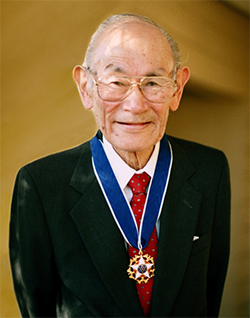The documentaries are “Unfinished Business: “The Japanese American Internment Cases,” directed by Steven Okazaki, and “Pilgrimage,”directed by Tadashi Nakamura.

An hour-long discussion and question and answer session will follow with former internees Aiko and Edwin Uyeki and their family members.
Humboldt State’s Jan. 29 observance marks the state of California’s decision in 2010 to designate January 30 as the annual anniversary honoring Korematsu for his lifelong fight for civil rights. He received the Presidential Medal of Freedom in 1998 after he won a federal court case that overturned his conviction under President Roosevelt’s post-Pearl Harbor executive order. The order authorized the secretary of war and military commanders to incarcerate all individuals of Japanese ancestry in internment camps.
An Oakland native who worked as a youngster in his family’s flower business, Korematsu reported for military duty but the Navy rejected him due to stomach ulcers and he could find no employment after Pearl Harbor. The U.S. Supreme Court upheld the legality of Roosevelt’s internment order, but Korematsu’s conviction was thrown out decades later with the disclosure of new evidence that had been withheld from the courts by the federal government during the war. The new evidence refuted the necessity of internment.
In the years before Korematsu’s death in 2005, he served on the Constitution Project’s bipartisan Liberty and Security Committee. The project is a think tank that advocates rule of law and criminal justice programs.
The HSU commemoration is co-hosted by Associated Students, the Library and the MultiCultural Center.
Details are posted at HSU Library News.